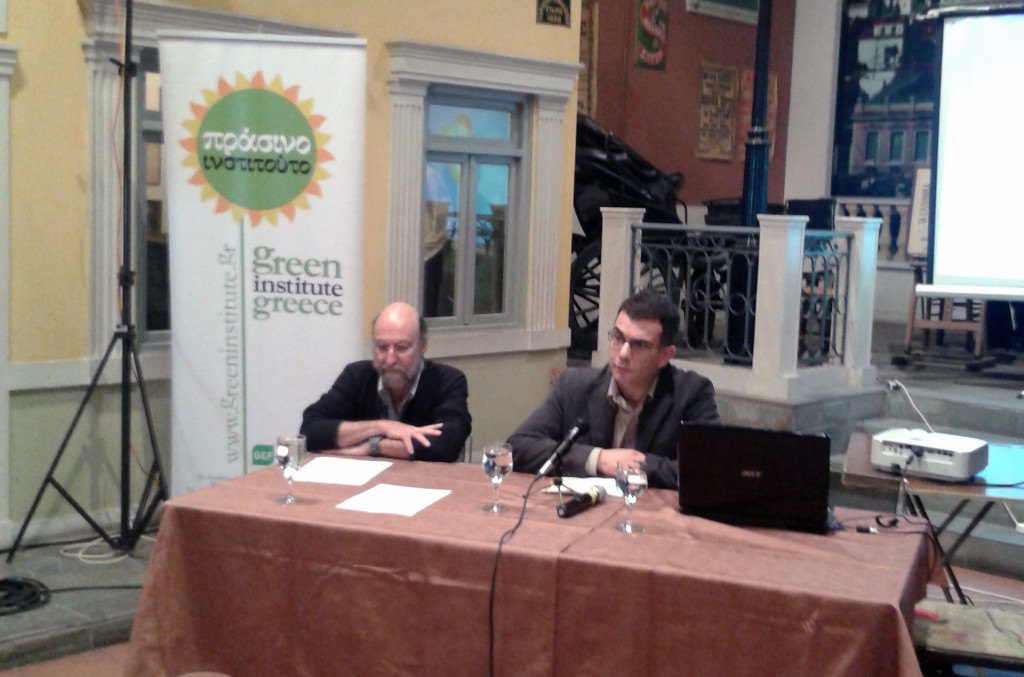On 6 December 2014 the Green European Foundation (GEF) with the support of the Greek Green Institute (GGI) organized a public discussion in the “Melina Merkouri” Centre in Athens, Greece. The seminar was part of the pan-European “Socio-Ecological Reindustrialisation” (SERIND) project which is co-ordinated by GEF and involves seven Green Foundations from seven EU countries with at least one seminar taking place in each participating country. The theme for the Athens event was ” For a transition of Greece –and W. Macedonia in particular- towards a post-lignite future: Challenges and potentials”.
The aim of the event was to gather inputs and good practices from other Regions in Europe that are facing a transition to a post-mining future, to investigate if and to what extent lignite is indeed necessary to the electricity System in the coming decades and to outline alternative opportunities for the region.
It has to be noted that while the event was taking place, at some point the building was occupied by activists in solidarity to an anarchist in hunger strike. The occupiers let the discussion proceed but refused entry to participants that were arriving for the afternoon sessions.
Tasos Krommydas, President of the GGI, welcomed the participants, presented the SERIND project and its objectives and gave an overview of lignite’s dominant role in the Greek energy system and the need for a planned gradual termination of its use in the next couple of decades. Recent developments, such as the scientific consensus regarding climate change, new European targets on climate and air quality and the rapid decline in renewable energy costs have made such a transition both more urgent and realistic.
Konstantinos Despotidis, vice-Mayor of Kozani, the capital city of the Region of Western Macedonia, spoke on behalf of the Mayor, Lefteris Ioannidis who was unable to attend the meeting. He described the impacts of lignite in the area and noted the lack of specific scientific knowledge on these impacts, the lack of sober and informed public dialogue on all relative aspects and the lack of timely planning and citizens’ involvement for the region’s future. He also informed us that the Municipality would very much like to hold a similar public event in Kozani, in Spring 2015.
Carsten Debes (Presentation in PDF format), project manager of the ReSource Project, gave a presentation on the transformation experiences in Central European Mining Regions, based on the outputs of the project, with a focus on the cases of the Regions of Bohemia in Czech Republic and Lusatia in Germany. He noted that such regions exhibit cultural potentials (including the preservation of industrial heritage, the existence of work skills and a community solidarity culture, the hosting of cultural or sport events) as well as natural potentials (including planting of trees for biomass, the development of geothermal energy for district heating, using old tunnels for safety trainings). Finally, three approaches to post-mining local development were outlined: Where Regions are left to market self-regulation, decline typically follows mainly due to lack of incentives or internal capacities for alternative development paths. Where the driving force is a top-down state planning and intervention, the results are often not effective or sustainable. A preferred approach would be one where the driving forces in the transformation process are grass-root initiatives in a bottom-up approach. It is crucial to start planning as early as possible, to achieve a consensus on a post-mining vision, to foster citizens’ initiatives linking them to key state and market players, to think multi-dimensionally addressing economic, environmental and cohesion challenges and to not be afraid to experiment taking full advantage of local endogenous potentials.
George Amanatidis (Presentation in PDF format), Director General of W. Macedonia Development Company presented the Operational Development Plan for the post-lignite era in the Region whose strategic directions are to protect the environment and quality of life, and to diversify local entrepreneurship and employment.
Lazaros Tsikritzis (Presentation in PDF format) from the Ecological Movement of Kozani, stressed that the Region’s focusing on lignite in the 50s was a reasonable choice, but that cannot be the case in the 21st century. He noted that for 60 years the prefecture of Kozani has been burning in order to fuel the whole country and presented available data on exceedances of air quality limits, health effects, impacts on water resources and the relocation of whole villages to make way for new mines. A long-term development plan is essential, including an international masterplan competition, necessary funding mechanisms, creation of new jobs in the manufacturing of renewable energy equipment, and clarification of ownership issues on the huge expanses of depleted mines.
The next session focused on the Greek electricity system and the role of lignite.
Marios Leonardos (Presentation in PDF format), Director of mines’ planning and production in the Public Power Corporation (PPC) outlined its strategy and planning for lignite’s role in the mid- and long-term. He noted that Greek lignite is quite expensive per thermal content compared to other deposits in Europe and the USA. According to current estimates, lignite-fuelled generation is projected to fall from 25TWh in 2014 to around 13TWh in 2030. The second of the new lignite plants that are in PPC’s investment plan is facing issues with access to lignite.
Nikos Mantzaris (Presentation in PDF format), energy & climate coordinator, WWF Greece, noted the effect of EU’s Industrial Emissions Directive to speed up the decommissioning of old lignite plants and stressed the cross-party support for lignite and generally the poor level of public discussion on such issues. He also presented interesting international developments that should inform decision makers, such as the stopping of international funding for new coal plants from major countries and institutions, USA’s new domestic policies and agreement with China, the growth of the divestment movement, the new round of EU air quality legislation and the rapid decline in renewable costs.
Dimitris Ibrahim, Campaigns coordinator of Greenpeace Greece, stressed that the PPC is too conservative and is missing out on most opportunities they have available for shifting to a business model away from lignite and heavy fuel oil in the islands.
Apostolos Dimopoulos, President of the RES Coop of Sifnos island, described the process and the challenges that led to the creation of a renewable energy cooperative with dozens of members already, starting from an initial idea of just a few people. He also gave an overview of the situation regarding RES coops in major EU countries through his involvement in the REScoop paneuropean initiative.
At this point, we were informed by the occupiers of the building that we had to finish the meeting.
Despite the unforeseen contingencies, all participants congratulated GEF and GGI for the initiative to hold an event on such a crucial issue that sadly remains outside the public dialogue, praised the level of the presentations and the discussions and look forward to more relevant discussions both in Athens and in Kozani.

